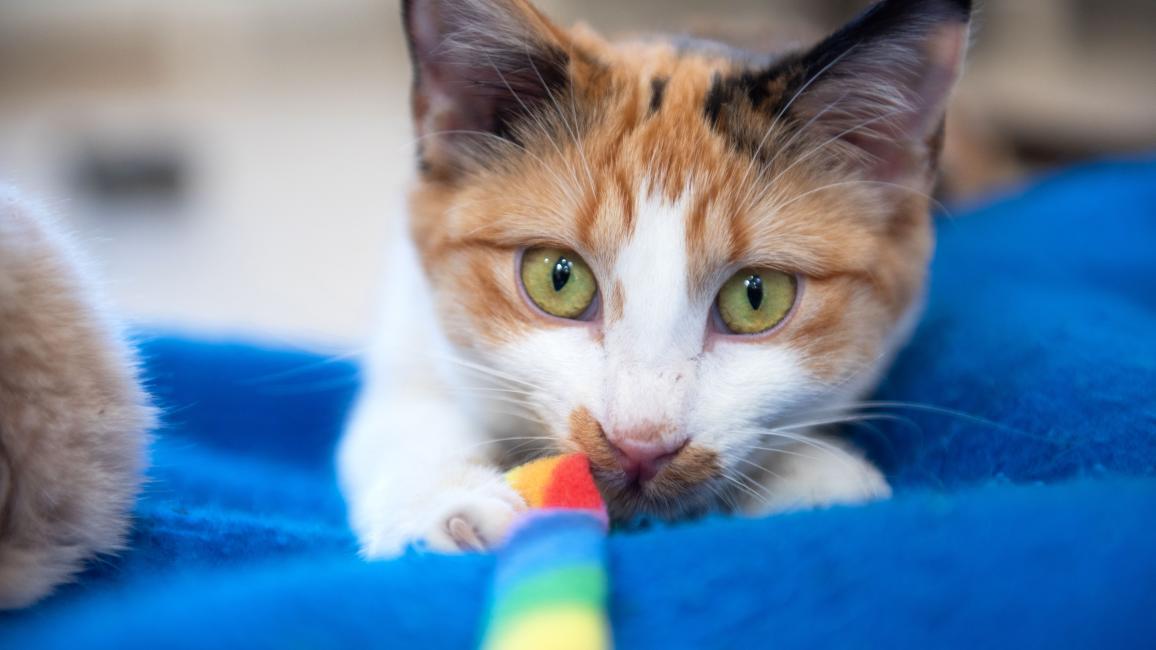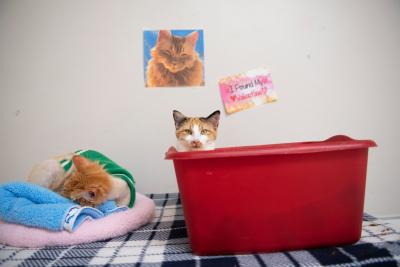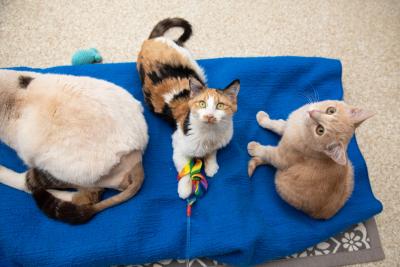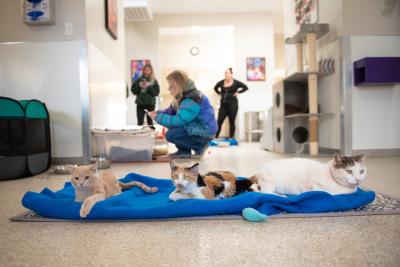From tongue to tail, kitten thrives after trauma

Step into the right building at the right time in Cat World, and you might just spot a petite, multicolored flash of fur bouncing around the corner in a high-speed toy chase. Any other time, Dolly is probably conked out in a sunbeam, melting with her friends into a spectacular kitty cuddle puddle.
At 8 months old, Dolly is still very much in that play, play, play and then nap, nap, nap stage of life. She’s lovable, snuggly, and adores making new friends, both feline and human alike. And if you could ask her, she’d probably say life is pretty good these days.
But it wasn’t long ago that this bright, happy kitten needed a lot of help — help that she found at Best Friends Animal Sanctuary.

An absolute Doll(y) at the clinic
It was toward the end of autumn that 3-month-old Dolly arrived at the Best Friends Animal Clinic after being found by herself outside in a troubling state. Her soft, calico coat was matted, and the person who’d caught her had already removed dozens of ticks from her tiny body. She couldn’t go to the litter box on her own, there were sores on her tongue, and she limped when she walked.
At first glance, it seemed like Dolly had suffered from a tail-pull injury, leaving her incontinent and in need of help from caregivers to empty (or express) her bladder. And the sores on her tongue were consistent with early signs of calicivirus, a common cause of upper respiratory infection in cats — especially at a young age. So she was put on medicine to help relax her bladder for expressing, and the veterinary team kept a close eye on her potential illness.
[Tiny kitten overcomes a big problem]
Dolly never developed any other symptoms of calicivirus. But her tongue only continued getting worse, becoming tough and swollen in parts.
Given the absence of other virus symptoms, and further examination after Dolly had been at Best Friends for several days, veterinarians had a different opinion about what might have caused the issues. Their best guess was that the state of Dolly’s mouth appeared to be caused by injury, rather than illness: tissue damage consistent with electrocution. It looked like she had bitten off way more than she could chew by chomping into a power cord.
So Dolly stayed at the clinic for treatment and observation. She was prescribed pain medication for her mouth, and despite her condition, she was always in a good mood. She never lost her appetite, and though she couldn’t lap up her wet food, she would open her mouth really wide and shovel it in like a kitten-sized excavator — a bit messy but effective.
With time and lots of TLC, what could be saved of Dolly’s tongue began to recover — bright pink and healthy once more, though a bit smaller when all was said and done. She didn’t mind though. She could clean her paws just fine, and she was quite happy to let her human friends take care of the rest of her grooming needs.

Another big turnaround for a little kitten
After her stay at the clinic, Dolly fell right back in step with her feline roommates at Cat World — kittens her own age whom she could chase, tumble, and wrestle with plus older, more experienced cats who’d let her cuddle up for nap time when she was all tuckered out. She could be a little shy at times with new people. But she never said no to a good head scratch, and purring came easily to her.
Her pain and bladder-relaxation meds continued, and caregivers gently helped her empty her bladder several times a day — at least until they noticed something a little different was going on.
“Every time we went to express her, her bladder was really tiny,” explains caregiver Mike Bzdewka. Usually — especially for caregivers trained to help incontinent cats — their bladders are very obvious. But suddenly, there was nothing for Mike or Dolly’s other caregivers to empty. Concerned Dolly might be dealing with a urinary tract infection that left her leaking when they weren’t looking, caregivers set her up overnight in a cat tower with food, water, comfy beds, and a litter box to see whether they could find any signs of an infection.
[Big new life for a blue-eyed kitten]
And when they came in the next day, they were stunned. Dolly had used her litter box all on her own. She’d been taking care of her own business, which is why there was nothing left to help her with. “Probably the (medication) was making her bladder relax enough that she could go,” Mike says. “We don’t need to check or express her anymore.”
There was talk among caregivers and veterinary staff about whether, perhaps, Dolly’s incontinence and limp had been caused by the same electric shock that had hurt her mouth. Temporary, partial paralysis could explain both — and her new ability to use the litter box. But the important thing was that she was feeling so, so much better.
It's been several months since Dolly last needed help going to the bathroom, her limp has faded away, and when she yawns and shows off that healthy, clear mouth, it’s hard to even imagine her early days at the clinic.
Sure, she’ll probably always be a messy eater, and her fur will need a little extra brushing every day. But she’s both a survivor and a charmer, and it’s a safe bet that before long she’ll be settling into a new home where she’s loved just the way she is.

Play with kittens every day
By fostering kittens, you are saving lives and spending time with kittens. It’s win-win, really.